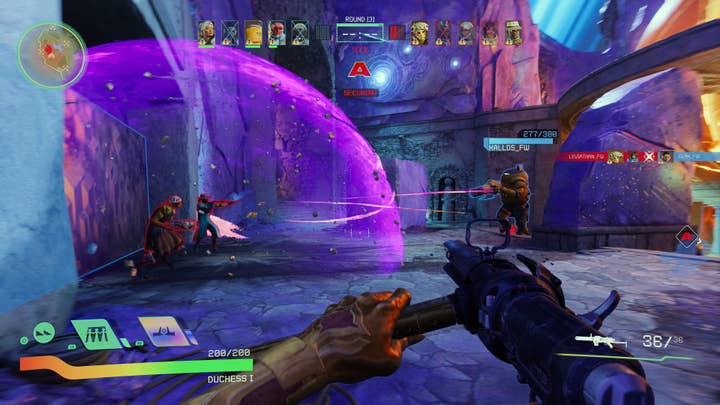How many players does a game like Concord need to survive?
We speak to experts about the myriad factors behind the decision to shut down a live service title
Last night's news that Sony is pulling the plug, perhaps temporarily, on its new live service hero shooter Concord will not have come as a big surprise to many.
Within days of the game's launch, reports emerged that it had sold an estimated 25,000 copies – 10,000 on Steam, 15,000 on PlayStation – and player counts were low. According to SteamDB, Concord peaked at 697 concurrent users on August 24, the day after launch, and dropped sharply after that.
Even as we recorded this week's GI Microcast on Monday morning, discussing the myriad reasons behind Concord's struggles, just 39 people were playing.
No company takes the decision to shut down an online game lightly, especially when live services are a big part of your ongoing strategy. Canning Concord will have been based on many, many factors, but it's a safe bet that sales and active player count will be chief among them for Sony. After all, multiplayer games are expensive to operate and doing so to only service a small number of people is not cost effective – particularly in such financially turbulent times as these.
So how many players does an online game need to warrant its continued development and support? The answer will of course vary for each title depending on the developer's size, situation, and its financial and creative objectives. Fortunately, we asked analysts and development veterans to help shed light into the process behind these game-killing decisions ahead of our live Q&A podcast during Devcom 2024.
"Is this a trick question?" laughs Piers Harding-Rolls, head of games research at Ampere Analysis. "There are so many variables in play here that it’s not really possible to answer this. For one game it might be 200,000 monthly active users, for another two million."
He lists of a variety of factors that affect whether a game lives or dies: R&D investment (both before and after launch), salaries and other staffing costs, marketing spend, infrastructure and service delivery costs, the game's business model and its monetisation strategy, platform support, financing repayments, licensing costs, publishing costs – the list goes on.

"Across all these elements, not one game or games company is exactly the same, so the break even number will differ as a result," Harding-Rolls adds.
"Aside from return on investment, there is another factor which needs to be considered: having a big enough population to make the game playable and fun wherever you are in the world. As a player you don’t want to be waiting ages as the game finds other players to join your team or compete against. If there is a sense that a game is underpopulated, players will be turned off and go, and find something else to play."
Concord isn't an outlier. We've seen dozens of online games shut down over the past two years, and sometimes after a relatively short time of being live.
For instance, Synched – a free-to-play shooter developed and published by Tencent, the world's largest games firm – was shut down just one year after launch. A source at Tencent told GamesIndustry.biz the game was catering to just 10,000 daily active users by the end, with concurrent estimated to be between 500 and 1,000.
In February 2023, eight shut down announcements were made within the space of a week, with affected titles including Apex Legends Mobile, Rumbleverse, Knockout City, CrossfireX, Crayta and Dragon Quest The Adventure of Dai: A Hero's Bonds.
Knockout City was just two years old when its servers went dark, and developer Velan Studios had already shifted the game to a free-to-play model in the hopes of attracting more players after it split with publisher Electronic Arts. Velan co-founder Guha Bala tells us the game ranged between 1,500 and 5,000 peak CCUs before it shut down.
Bala echoes Harding-Rolls' comments when he tells us that deciding whether or not to end an online game is a "nuanced issue." Again, the number of active players required to survive depends on a range of factors, including the type of game you're operating.
"For a PvP multiplayer game that is skill based, especially for ranked play, each region should have a peak CCU count of 10,000," says Bala. "As the CCUs disperse between regions, asymmetric latencies relative to the server become factors, so matchmaking times can increase dramatically. Some regions, like Australia, are intrinsically challenged because they are low population and far away from other regions.
"There are strategies like the special rollback code that we used in Knockout City that made the game a good experience at much lower CCUs, so we could push 2,000 CCUs and still provide a good experience in North America and Western Europe."
"If there is a sense that a game is underpopulated, players will be turned off and go, and find something else to play"
Piers Harding-Rolls, Ampere Analysis
Games that aren't built around skill-based matchmaking can survive with a lower number of players, with Bala suggesting 5,000 CCUs per region. Meanwhile, PvE games can function with even fewer – around 1,000 to 3,000 CCUs per region – because bots can serve as both enemies and allies, meaning the player's experience is less reliant on the presence of other humans.
Bala adds that the business model can be a "far bigger issue" when it comes to keeping a game alive. Continuing operations and developing new content relies on more money coming in, so player retention becomes crucial. With free-to-play games, for example, he estimates that at least 5% of the total userbase need to be spending in order to maintain costs (although this can of course vary from title to title). This means the number of CCUs needed to be economically viable might be closer to 50,000 or more for some free-to-play titles, which Bala describes as "a big barrier to entry for most new games."
Concord, however, was not free-to-play, instead opting for a Helldivers 2-style mid-range price point. The game also did not feature microtransactions or a battle pass, so the revenue it generated was purely from sales – and while we don't know Sony's sales expectations, it's a safe bet the estimated 25,000 for week one are far short of what the shooter needed.

Plus, premium titles for PC and console often have larger teams, which further increases your costs. Based on his own experiences, Bala hypothesises that a 50-person team would amount to $500,000 a month just in labour costs – based on that, he estimates a $20 game would need to sell 25,000 per month to match this. Concord, meanwhile, had a $40 price tag and developer Firewalk Studios had at least 150 staff.
Despite the costs, and the fact his own game shifted to free-to-play, Bala believes more live service games need to be built around the premium model.
"Personally, I think for there to be an explosion of innovation in the PvP area, we need to find more routes to experiences that players would pay for up front," he says. "Otherwise, that segment of the market will look more and more like mobile titles, where monetisation and paywalls often take the place of compelling emotional experiences."
Whether this is the end for Concord remains unclear. In yesterday's statement, game director Ryan Ellis said the Firewalk team will be "exploring other options" for how to take the title forward.
What is clear, however, is that launching a new live service title may be tougher than it's ever been. With millions wrapped up in the likes of Fortnite, Roblox, GTA Online and others, enticing them to try a new title – even for a short period – is no easy feat. If even the market-leading PlayStation is struggling to pull in the players required, it's safe to surmise that Concord won't be the last short-lived online game we see in the years ahead.








